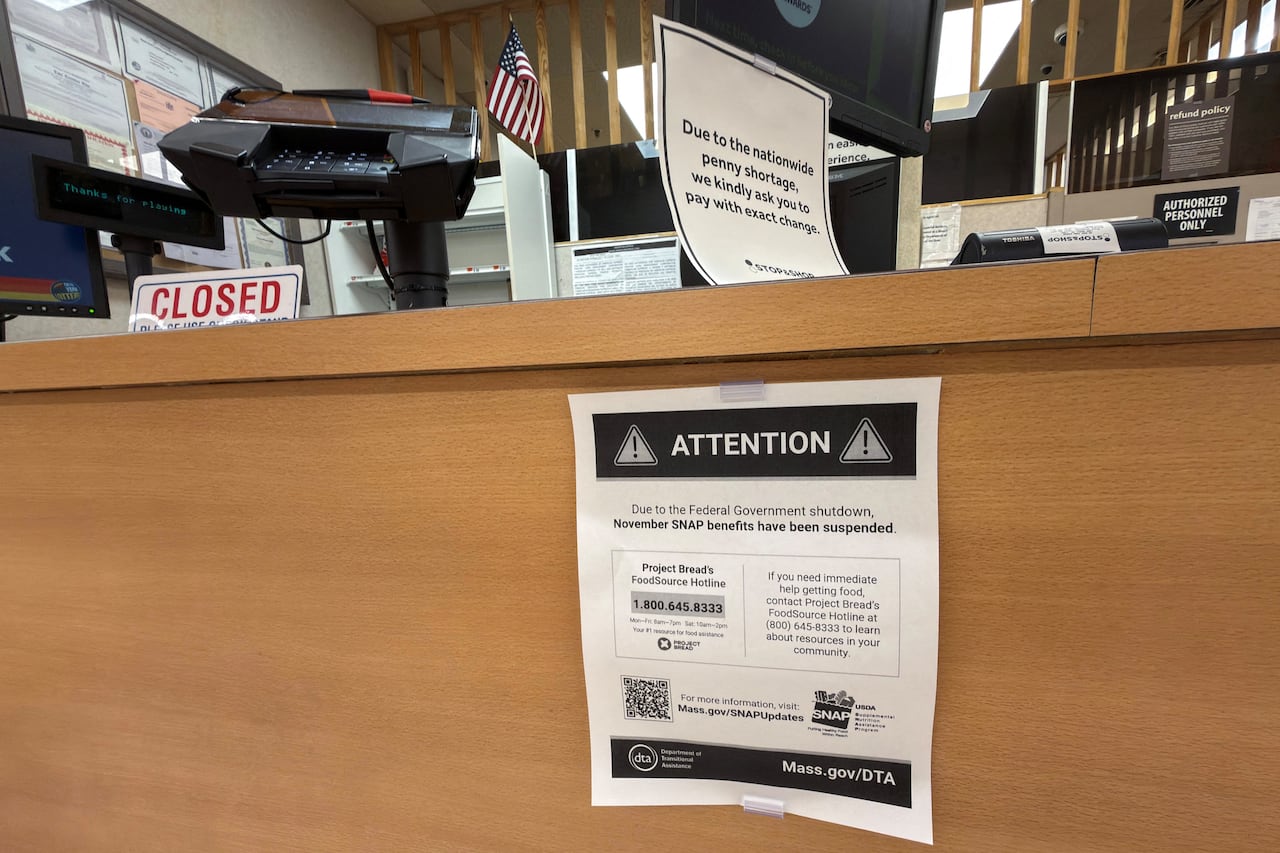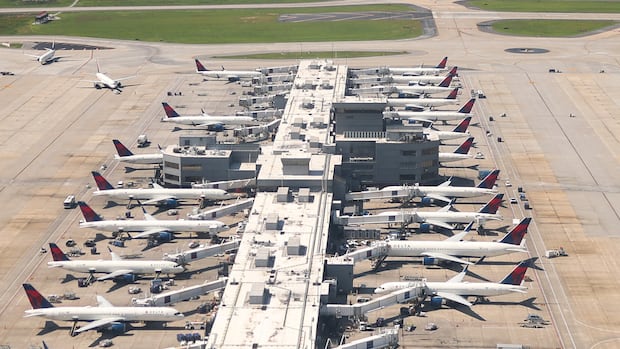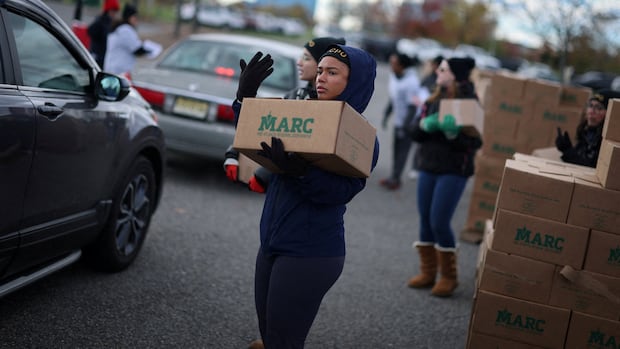Listen to this article
Estimated 6 minutes
The audio version of this article is generated by text-to-speech, a technology based on artificial intelligence.
A federal judge has ordered U.S. President Donald Trump’s administration to fully fund this month’s food aid for 42 million low-income Americans by Friday, blocking its plan to only provide reduced benefits during the record-long government shutdown.
U.S. District Judge John McConnell in Providence, R.I., accused the administration on Thursday of withholding Supplemental Nutrition Assistance Program benefits, known as SNAP or food stamps, for “political reasons” as he ordered the U.S. Department of Agriculture (USDA) to fund the program so people get 100 per cent of their benefits.
“The evidence shows that people will go hungry, food pantries will be overburdened, and needless suffering will occur,” McConnell said during a virtual court hearing on Thursday. “That’s what irreparable harm here means.”
The Trump administration quickly moved to appeal McConnell’s decision, which stunned Democratic Sen. Patty Murray of Washington.
“I have never seen an American President so desperate to force children and seniors to go hungry,” Murray said on social media. “Donald Trump is appealing a federal court’s order requiring him to pay the full SNAP benefits for this month. This is as ugly and cruel as it gets.”
Trump’s administration asked a federal appeals court on Friday to suspend any court orders requiring it to spend more money than is available in a contingency fund.
The court filing came even as Wisconsin Gov. Tony Evers’s spokesperson said on Friday that some SNAP recipients in his state had already received their full November payments overnight on Thursday.
The appeal overall leaves it unclear whether SNAP benefits would ultimately be paid out to all eligible Americans.
‘Absurd ruling’: Vance
The administration lashed out at the ruling. A USDA spokesperson in a statement said Senate Democrats were the ones to blame for compromising SNAP by voting 14 times against a Republican-backed stopgap funding measure that would end the government shutdown, which is now in its 37th day.
Vice-President JD Vance, calling it an “absurd ruling,” gave mixed signals on how the government would proceed.
 U.S. Vice-President JD Vance speaks next to President Donald Trump on Thursday in the East Room of the White House in Washington, D.C. (Nathan Howard/Reuters)
U.S. Vice-President JD Vance speaks next to President Donald Trump on Thursday in the East Room of the White House in Washington, D.C. (Nathan Howard/Reuters)
“In the midst of a shutdown, we can’t have a federal court telling the president how he has to triage the situation,” he said at the White House.
“We’re not going to do it under the orders of a federal judge, we’re going to do it according to what we think we have to do to comply with the law, of course, but also to actually make the government work for the people in the midst of the Democratic government shutdown,” Vance added.
The Republicans, Democrats point out, control the White House, Senate and House. A Senate funding bill requires 60 votes to pass, however, meaning the Republicans with their 53-47 advantage would need several votes from their counterparts.
Back and forth with the courts
SNAP benefits are paid out monthly to eligible Americans whose income is less than 130 per cent of the federal poverty line.
States handle the day-to-day administration of the benefits. The maximum monthly benefit for the 2026 fiscal year had been set at $298 US for a one-person household and $546 for a two-person one.
The administration had originally planned to entirely suspend SNAP benefits in November, citing a lack of authorized funding from Congress as a result of the government shutdown.
 A sign hangs at a customer service area on Monday at a grocery story in Long Beach, N.Y., indicating that the shutdown has impacted services. (Shannon Stapleton/Reuters)
A sign hangs at a customer service area on Monday at a grocery story in Long Beach, N.Y., indicating that the shutdown has impacted services. (Shannon Stapleton/Reuters)
McConnell and another judge in Boston hearing a related case by Democratic-led states last week ruled the administration was required to at least tap $5.25 billion US in emergency funding to partially fund SNAP benefits, which cost $8.5 billion to $9 billion per month.
Last week, McConnell gave the Trump administration the option of either using the contingency funding once it resolved the “administrative and clerical burdens” involved in paying reduced benefits or tapping additional funding to fully pay out November’s SNAP benefits.
In light of his ruling, the USDA opted on Monday to only use contingency funding, which after subtracting $600 million for the states’ administrative costs in administering SNAP benefits would leave $4.65 billion to cover benefits.
The USDA initially said that maximum allotments would be as a result cut by 50 per cent, but updated is calculations late on Tuesday to say they were being reduced by 35 per cent.
The administration’s decision to only partially fund SNAP has fuelled uncertainty about how much and when households will receive their monthly food aid, prompting states to encourage SNAP recipients to budget and visit food pantries.
McConnell, an appointee of former Democratic president Barack Obama, said in going that route, USDA failed to address a known problem and that in some states it could take weeks or months to change antiquated computer systems to process the reduced benefits, which has never been done before.
A group of Democratic-led states in the related case in Boston reported earlier on Thursday that Minnesota had determined it would take at least six weeks to rewrite its computer systems to process the reduced benefits, and Pennsylvania would need at least nine to 12 days to restructure its system.
WATCH | FAA issues order to gradually scale back domestic flights:
40 U.S. airports to reduce flights over government shutdown
Airports in 40 U.S. cities like New York, Atlanta and Los Angeles will have flights reduced following an order from the Federal Aviation Administration to cut traffic by four per cent on Friday, to ease the pressure on unpaid air traffic controllers during the government shutdown.
McConnell agreed with lawyers for the cities and non-profits at the liberal legal group Democracy Forward, which had sued over the suspension of SNAP benefits, that the USDA had failed to address the administrative burdens that partial benefits entailed and that as a result it needed to tap a $23.35 billion fund derived from tariffs that has been used for child nutrition programs.
In finding the administration had failed to comply with his earlier order, McConnell pointed to a recent statement Trump had made on social media that SNAP benefits would only be paid when the shutdown ended, which he said reflected the president’s “intent to defy the court order.”
“Last weekend, SNAP benefits lapsed for the first time in our nation’s history,” McConnell said. “This is a problem that could have and should have been avoided.”

